Ever curled up under a blanket, all warm and cozy, but your feet still feel like ice? You’re not alone! Cold feet are more than just a quirky phrase—they’re an actual thing, and if it seems like no matter what you do, your feet just won’t warm up, there might be more going on.
Let’s take a deeper look into why your feet always seem to be freezing and what you can do about it.
Why Do Feet Get Cold?
Your feet are like the body’s thermometer. They tend to get cold because of how blood circulates in the body. When you’re cold, your body prioritizes keeping vital organs warm, sometimes at the expense of your extremities like your feet and hands. But if your feet are always cold, even when the rest of your body feels warm, there could be underlying reasons worth exploring.
Causes of Cold Feet
1. Poor Blood Circulation
One of the biggest culprits behind cold feet is poor blood circulation. Blood carries warmth throughout the body, so if your circulation is a bit sluggish, your feet might not be getting enough of that toasty warmth. Sitting for long hours or even standing in one place can cause this, but it can also be a sign of something more serious like peripheral artery disease (PAD), where your blood vessels become narrow and restrict blood flow.
2. Anemia
Ever heard of anemia? It’s when your body doesn’t have enough red blood cells to carry oxygen properly. When there isn’t enough oxygen, your feet (and hands) can feel extra cold. If you’re constantly tired, dizzy, and your feet are cold all the time, it might be worth getting checked for anemia.
3. Hypothyroidism
If your thyroid isn’t pulling its weight, it can slow down your metabolism, which affects how your body regulates temperature. Known as hypothyroidism, this condition can leave you feeling cold from head to toe—especially in your feet.
4. Raynaud’s Disease
This condition sounds a little fancy, but it’s pretty straightforward: when you’re cold or stressed, the blood vessels in your extremities (like your feet or fingers) overreact and shrink. This can turn your toes a white or bluish color. Once the blood starts flowing back, your feet might even hurt a little as they warm up. If you’ve noticed your feet change color when they’re cold, Raynaud’s could be the reason.
5. Diabetes
People with diabetes often experience diabetic neuropathy, a type of nerve damage that causes numbness, tingling, and cold sensations in the feet—even if they’re not actually cold to the touch. If you have diabetes and your feet are always cold, it’s a good idea to talk to your doctor.
6. Stress and Anxiety
Yep, your mind can mess with your body in all sorts of ways! When you’re stressed or anxious, your body’s “fight or flight” response kicks in. It sends blood to the important organs and away from your extremities, which can leave your feet feeling icy even if you’re not actually in danger.
7. Vitamin Deficiencies
Lack of certain vitamins, like Vitamin B12, can affect your nerves and circulation. If your diet is low on B12, you might notice your feet getting colder more easily. Taking care of your vitamin levels can be a surprisingly simple fix.
8. Lifestyle Factors
Inadequate footwear, poor diet, or lack of physical activity can all contribute to persistent cold feet.
9. Health Conditions
Other conditions, such as peripheral artery disease (PAD), can significantly affect blood flow to your feet.
10. Environmental Factors
Exposure to cold weather or damp environments can also cause your feet to feel cold, regardless of your body temperature.
What Can You Do About Cold Feet?
The good news? You don’t have to live with cold feet forever. Here are some things you can try:
- Move around: Simple activities like walking or even wiggling your toes can boost circulation and help warm up your feet. Think of it as giving your blood a gentle push to get where it needs to go.
- Wear the right socks: Sometimes, all you need is the right pair of socks! Wool or thermal socks work wonders, especially when regular cotton doesn’t cut it.
- Stay hydrated: Staying hydrated helps your blood flow more easily, and better circulation can keep your feet warmer.
- Check your thyroid and iron levels: If you suspect anemia or hypothyroidism, get a blood test to confirm. Treating these conditions can go a long way in getting your feet to feel normal again.
- Manage Your Stress: Stress isn’t just bad for your mind; it’s bad for your feet too! Try relaxation techniques like deep breathing, meditation, or yoga to help keep your body (and your feet) calm.
- Consult a doctor: If your feet are always cold and none of these tips seem to help, it might be time to check in with a healthcare professional. Conditions like diabetes, PAD, or Raynaud’s disease need proper medical attention.
Conclusion
Cold feet might seem like a harmless nuisance, but they can actually be a sign that something else is going on in your body. Whether it’s circulation issues, a vitamin deficiency, or even stress, it’s important to pay attention to what your feet are telling you. So, the next time your feet feel like they’re auditioning to be ice cubes, take a moment to consider what might be causing it—and then slip into a pair of cozy socks while you figure it out!
